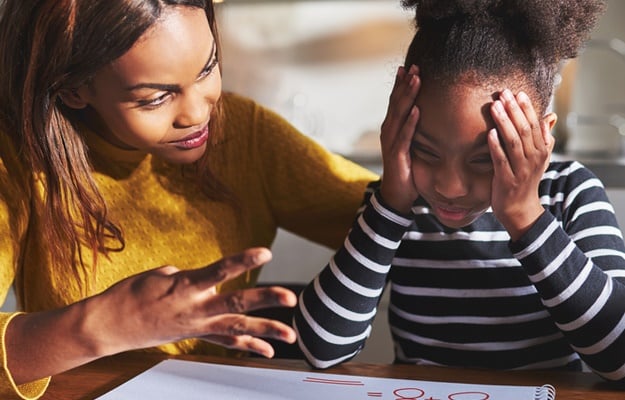
By now the Covid-19 pandemic is on every parent's mind.
However, it is the responsibility of parents to inform their children about what's happening.
Or is it? Some parenting styles suggest it is better not to explain issues such a frightening pandemic to the younger kids, or to be very careful in what, and how you tell them.
Parent24 asked parents how they have chosen to approach sharing the grim news with their kids.
Shielding
Mother of two, Emily says, "In our home we keep things calm by sharing information with the kids (3 and 6 years old) on a need-to-know basis. For the past few weeks we haven't actively told them anything in particular about the pandemic."
"They watched the president's address on Sunday night, but got bored very quickly. On Monday we explained that school was going to close, and very gently ended the term."
"Then on Tuesday, I carefully explained that we're going to stay at home, no playdates or parks or shops, for a few days, because there is an illness in the world, and while we might get sick and feel a little unwell, we'll be okay."
Emily says she explained how they want to protect the grandparents from getting sick, so won't be seeing them for a little while.
"I kept it calm, I said it was serious, but I don't want to scare them," she explained. "I don't want them to worry or be afraid of something they can't understand or control, or even see or visualise."
Communicating
Aileen, a mother of one says, "I've told my daughter about it straight away. With child care closed she was of course asking questions, and is smart enough to realise that things a bit different at the moment."
"I told her that there is a virus out there that makes lots of people sick but that we can all fight it by staying home and being nice to each other. She understood perfectly without being extremely scared or upset," she told Parent24.
Aileen says her daughter very matter of factly said that it makes sense, and understood the need to contribute by staying at home.
Nuri, a mother of three told us, "Besides whether I want to tell the girls or not, the schools have already informed my two older girls."
"Nevertheless, I also told them about it and the realities. They need to be aware, practice caution. They forget to wash their hands sometimes, I constantly remind them."
Educating
Celeste, a mother of two, told us, "I've been very open about it with the view to educate and be proactive so we can prevent getting it, as far as we can."
She added, "I'm also open with my boys because it's affecting us financially as lots of my work is on hold due to work opportunities being postponed."
"Another reason I'm talking to them is that if schools don't go back on the scheduled date, they can start to mentally prepare to learn in a different way, such as online learning."
Celeste says she'd much rather be open with them so they can start to anticipate a number of different scenarios.
- FEEL GOOD | How this local 7-year-old started his hand-sanitiser business after learning about coronavirus
- Your family and Covid-19: Parent24 has you covered
- 'Name it to tame it': How parents can help their children make sense of the consequences of Covid-19
A gentle explanation
The Waldorf School of Philadelphia has outlined steps parents can apply to gently inform their children about Covid-19.
Here are the various options:
Shielding vs Communicating
It would seem ideal to shield small children from troubling information.
However, children in young grades would possibly know about the pandemic either because of school or exposure to older children on playgrounds and older siblings at home.
When it becomes apparent that your child has heard about the virus, then age-appropriate communication can begin, with the foremost focus placed on helping the child feel safe and more secure.
Listening and Tailoring Responses
If you think your child is aware of the virus, start asking them open-ended question to gauge what they know, and listen with intent.
Once you know how much they know, follow up with questions to understand their concerns.
Know that the coping needs of children differ from those of adults.
Adults may relieve anxiety by learning all they can or preparing their home for extended quarantine, whereas children will not necessarily take comfort in these measures.
A key part of listening is to make sure you're never dismissive of your child’s fears, even if they seem irrational.
Always know what your child is feeling.
- Worried about your child getting coronavirus? Here’s what you need to know
- Do you have enough toilet paper to last a coronavirus quarantine? Find out here
- Coronavirus: Are imported baby goods safe for my family?
Older Students and Teens
It is important to be informed and remain updated, and it helps to provide details for this specific age group.
There is a lot of misinformation, conspiracy, and fear-based reporting online that older children are exposed to.
Provide your teens with knowledge about realistic and trusted news sources and information.
This includes giving them hand sanitiser when you take them shopping for medicine or food, or talking about ways to pass time if school is canceled for a long term period.
How are you coping during this time?
Chat back:
Share your story with us, and we could publish your mail. Anonymous contributions are welcome.
WhatsApp: Send messages and voicenotes to 066 010 0325




 Publications
Publications
 Partners
Partners















